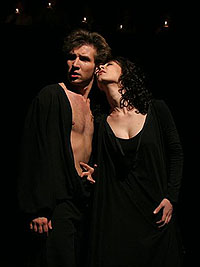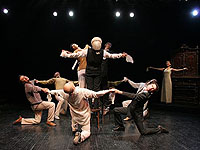 |
|
Uzbekistan - Theater |
|||
|
The theatrical life of modern Uzbekistan is quite diverse. There are 35 state theaters, including two opera and ballet in Tashkent and Samarkand, 10 music and drama theaters, as well as dolls theaters nationwide. Also, Russian music and drama theaters operate in Tashkent, Samarkand and Ferghana. Leading theaters of Uzbekistan are: National Academic Uzbek Theater, the Alisher Navoi State Academic Theater, Academic Russian Theater of Opera and Ballet, Tashkent Theater of Musical Comedy, the Mukimy Uzbek Musical Theater, "Ilkhom" Theater, and the Republican Youth Theater. It is natural, that most of the theaters are in Tashkent, the capital of Uzbekistan. Performances are staged both in Uzbek and Russian. With Uzbekistan gaining its independence, both national cultural and spiritual heritage now receive more consideration on the part of both people of arts and public, driven by need to learn and know them better. Thus, plays staged at theaters nationwide reflect topics of the rich Uzbek literary heritage, as well as those of world classic literature. Theaters actively react to the growing interest on the part of the public in historical personalities of the national history. Henceforth, historical plays usually come into being, such as "Mirzo Ulughbek", "Alisher Navoi", "Amir Temur", "Tumaris", "Nodirabegim", "Bobur", "Sobit Termizy", "Alpomysh", and others. Number of other plays concentrated more on historical realities of the close past - Turkestan during early 20th century - the period known as the most interesting in cultural and social- psychological aspects. The far-away epoch, which is almost forgotten by public, literally comes back to the theatrical stage given there are no ideological limits for its interpretation. Emergence of new ideas and thoughts, raise of the stage culture vis-a-vis modern understanding of it, led to the "purity" of style, the genre diversity of decisions on the part of both directors and actors. Now the new generation of directors is in search for new theatrical forms, ways beyond just prosaic storytelling, as well as joint use of the historical spiritual culture, national mentality with the image of the contemporary theater. The best performances of the Uzbek theater constantly reflect the richest traditions of national music, literature, fine arts, and architecture. For instance, in the "The Great Silk Road" staged at the A. Khidoyatov Theater, director Bakhodir Yoldoshev and artist G. Brim portrayed the image of countries of medieval East, along whose territories the Great Silk Road used to pass along, through music, choreography, light, and color. And each of these countries, whether it be China, India, Iran, or those in Central Asia, fascinates with their mysteries. Thus, the virtual come-back of cultural traditions, local ethnography, folklore, national way of life, and rituals is one of the directions of contemporary Uzbek theater, which is reflected in number of recent shows, including "Cbimildik" (by T. Azizov and M. Abdullaeva) staged at the Uzbek National Academic Big Theater (formerly known as the Khamza Theater). At the same time, not only works by Uzbek writers are staged at theaters nationwide, but also those by "William Shakespeare, Oscar Wild, John Steinback, and other writers of the past and today. Also, Uzbek theaters successfully perform abroad. Several theaters from all over Uzbekistan recently participated in various festivals, which took place in Germany, France, Slovakia, India, Egypt, Poland, Italy, Belgium, Palestine, Russia, and United States. Today Uzbek theater demonstrates harmonious development of culture in the country - the culture, unique of its kind, the one that carefully preserves its originality, but, at the same time, not limits itself within its boundaries, and the one that graciously presents to the world its spiritual values, and the one that is open for achievements of humankind. There are several educational institutions nationwide, such as the Mannon Uighur State Institute of Arts, the Mukhtor Ashrafy Conservatory, and others, that train qualified directors, actors, choreographers, ballet actors, vocalists, and musicians in the field. |

